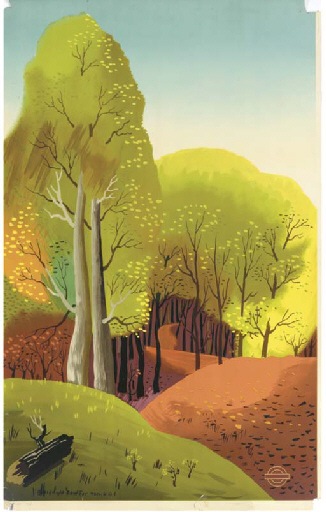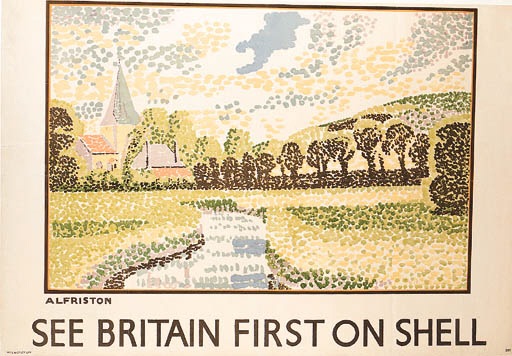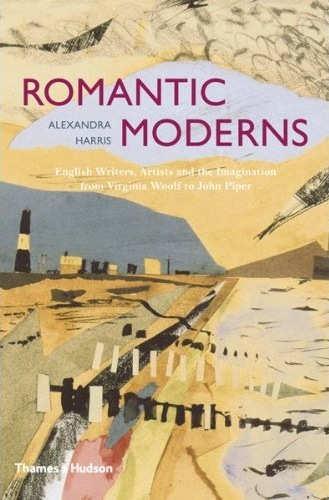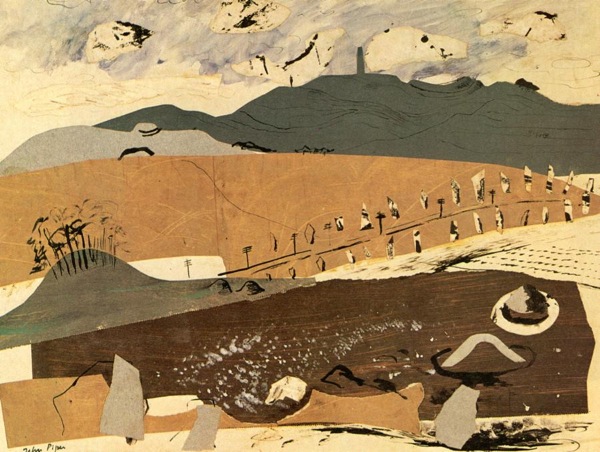I’ve been meaning to write about this book for a few days now, although I was going to wait until I’d finished it. It’s Romantic Moderns: English Writers, Artists and the Imagination from Virginia Woolf to John Piper, by Alexandra Harris, and it’s brilliant.
But now it’s only gone and won the Guardian First Book Prize, so I thought I’d better post something before it turns into stale news.
The main thing I want to say is that it’s a fantastic book. Not only is it clearly a great piece of research and art historical thinking but, joy of joys, it’s written to be readable. Very readable in fact.
And it’s speaking to us. To start with, any book which has this as a frontispiece,

McKnight Kauffer, 1938, How Bravely Autumn Paints Upon The Sky.
and this on the back cover has to be worth a visit.

Vanessa Bell, 1931, Alfriston.
But the whole book is in fact an extended consideration of a subject that I’ve been mulling over here before now: the relationship between being modern and being British/English. Here’s Paul Nash on the subject in 1932, in a quote I’d never seen before.
Whether it is possible to ‘go modern’ and still ‘be British’ is a question vexing quite a few people today […] The battle lines have been drawn up: internationalism versus an indigenous culture; renovation versus conservatism; the industrial versus the pastoral; the functional versus the futile.
The functional versus the futile is a great distinction, and one which makes me realise that I am probably on the side of the curlicue every time.
As I said, I’ve not got to the end oyet, so I can’t report any grand conclusions. But I’m not sure that there are going to be any to be had. The book’s genius is the way it meticulously goes through the details of art, architecture, theory and influences, mapping relationships, conflicts and coincidences. Here you will not find the underlying narrative of modernism, or Britishness, or of any other ideology, just the complexity of things as they happened.
All of which should be more than enough to convince you to put Romantic Moderns on your Christmas list on its own.
But I’m finding the book even more compelling than that, because it contains almost everything that I am interested in. That’s not just Bawden and McKnight Kauffer, Ravilious and Shell posters, the Johns Betjeman and Piper, but also a whole host of things that never find their way into this blog: aerial archaeology, Wiltshire, English regional food, gardening, Elizabeth Bowen and Virginia Woolf.
It feels as though someone has rifled through the piles of random facts in my head, sorted them out and then explained them back to me much more clearly than I could ever have done. It’s an interesting, if not entirely comfortable sensation; and one which also makes me realise just how much my sensibility and interests are rooted in these times and ideas.
A proper consideration will follow when I have finished it, but I do also have to say that it was worth the price of admission to discover this alone.
Archaeological Wiltshire by John Piper. I used to live in that view, literally and figuratively. Now, back to the book.

